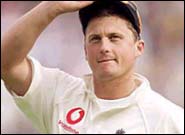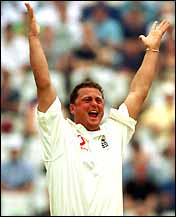Do England miss Gough?
Daniel Laidlaw
In less than three months, the first Ashes Test will begin. Every couple of years through the 1990s to now, the start of an Ashes series has been a
cue for expressing optimism that maybe, this time, England could seriously
challenge or even defeat Australia. Invariably, this has been followed
to a greater or lesser extent by England being smashed, leaving pundits to
wonder how they could have been so foolish.
Realistically speaking, 2002/'03 should not be any different. Australia
still reign at the top of Test cricket, while England's form is not much different than in the series played before the Ashes last year. Since then, however, England at least appear to have found some depth in their personnel, particularly and most importantly in the bowling department.
 With Gough and Caddick unavailable due to injury, England's attack leading into the series against India had been considered "weak". This was not quite case. Firstly, to label it weak in the absence of Gough and Caddick implied
that with them it was appreciably stronger. Against Australia last year, at least, that was plainly untrue. Both played the entire series of 5 Tests, Gough claiming 17 wickets at 38.64 and Caddick 15 at 49.86. As
spearheads, they failed to make a significant impression on the Aussies' batting, as
Australia scored first innings totals of 576, 401, 190, 447 and 641/4.
With Gough and Caddick unavailable due to injury, England's attack leading into the series against India had been considered "weak". This was not quite case. Firstly, to label it weak in the absence of Gough and Caddick implied
that with them it was appreciably stronger. Against Australia last year, at least, that was plainly untrue. Both played the entire series of 5 Tests, Gough claiming 17 wickets at 38.64 and Caddick 15 at 49.86. As
spearheads, they failed to make a significant impression on the Aussies' batting, as
Australia scored first innings totals of 576, 401, 190, 447 and 641/4.
In fact, in Australia's only completed innings under 400, it was not Gough
or Caddick but rather the oft-injured Alex Tudor who did the most damage,
with 5/44 in the third Test at Trent Bridge.
Since the 2001 Ashes, England has had a 1-0 loss in India, a 1-1 draw in
New Zealand, a 2-0 win over Sri Lanka, and currently holds a 1-0 advantage
from two Tests against India. Gough opted out of the earlier India series, missed
selection for the New Zealand Tests as a consequence, and then suffered
knee problems. He has not played a Test since the last against Australia 12
months ago.
Without him, though, Hoggard, Flintoff and co have more than held their
own. Including the first two Tests against India, Hoggard has flourished with
51 wickets at 28.19 during that span, while Flintoff has less impressive
bowling stats with 25 wickets at 44.12 but has emerged as a Test
all-rounder.
Highest totals against England during the Gough-less period have been
469 by India (next highest 291), 451 by New Zealand in second innings of a
match England won (next highest 269/9) and, in what proved to be an
aberration, 555/8 by Sri Lanka in the drawn first Test (next highest 308).
Overall, Gough's presence has not been unduly missed.
In the current series, England has twice had the better of India,
Hoggard claiming 3/33 and 4/87 at Lord's and 4/105 and 1/109 at Trent Bridge.
Both Hoggard and Flintoff have bowled with wholehearted effort, the latter
while reportedly carrying a groin injury. Rookie quicks Simon Jones and Steve
Harmison have also contributed. This "weak" attack has not been
noticeably poorer for Gough's absence.
Michael Atherton wrote in the Electronic Telegraph on August 4 that
while it seems "England are not missing their premier fast bowler," England's
Ashes challenge "will certainly be stronger with Gough around" and he would
like to see him charging in for the first Test "leading England's attack with
vigour once again."
 Vigour, Gough may well have once he recovers fitness, but would his
presence really make England's Ashes chances any stronger? Nasser Hussain, of
course, wants his best bowler back. But imagine if both Gough and Caddick had
been fit and playing this past year. England would not have blooded Simon
Jones and Steve Harmison and would have much less of an indication of their
potential than they do now. And Hoggard would not have had the
opportunity to prove his credentials as he has done.
Vigour, Gough may well have once he recovers fitness, but would his
presence really make England's Ashes chances any stronger? Nasser Hussain, of
course, wants his best bowler back. But imagine if both Gough and Caddick had
been fit and playing this past year. England would not have blooded Simon
Jones and Steve Harmison and would have much less of an indication of their
potential than they do now. And Hoggard would not have had the
opportunity to prove his credentials as he has done.
Gough does offer England experience against Australia, but not of the
winning variety. He is a well-known commodity to the Australians in a
way that Hoggard, Jones and Harmison are not. Plus, Gough as an Ashes bowler
should not be a cause for particular Australian concern.
From his 17 Ashes Tests since 1994/'95, Gough has been involved in just
three wins. Of those wins, the only one in which the fate of the Ashes
was still at stake was the first at Edgbaston in 1997, when he and Caddick
blitzed Australia on the first day, reducing them to 54/8 in an eventual
England victory.
In Melbourne, for the fourth Test in 1998, Australia already held an unassailable 2-0 lead when Gough took 5/96 in the first innings. But when Australia chased 175 to win in the second innings, it was not Gough but Dean
Headley, with 6/60, who bowled England into position to win. Gough took
2/54 - MacGill and McGrath, the final two wickets of a 12-run win.
And last year, in the fourth Test at Leeds, it was Mark Butcher's match-winning 173 not out after Adam Gilchrist had declared Australia's second innings at 176/4, rather than Gough's 5/103 in Australia's first
innings 447, which won England the match.
Gough has rightly been seen as the leader of England's attack. But
despite 74 wickets against Australia at the reasonable average of 30.81, he has
never been the potential Ashes-winning talisman reputation might
suggest, particularly now that other promising young bowlers are pressing for
consideration.
True, an improved England attack which relies less on Gough to provide
most of the wickets could make him more valuable. But after not playing Test
cricket for more than a year, undergoing knee surgery and having minimal
preparation, it really would not be such a poor outcome for England if
Gough missed the plane to Australia. Hoggard for his swing and Jones for his
pace should be first-choice selections. A fit Caddick, who has a bad record
against Australia but whose disconcerting seam and bounce has never been
tried Down Under, also makes it. Andy Flintoff demands selection as an
all-rounder, and possibly Giles or another spinner is included for variation. Harmison and Tudor (if healthy) also require opportunities. Fitting Darren Gough into this picture is not easy.
 It was as a young bowler himself that Gough enjoyed his best Ashes
series. He exploded onto the scene as a 24-year-old in 1994/'95, claiming 20
wickets at 21.25 from 3 Tests before suffering a foot fracture.
It was as a young bowler himself that Gough enjoyed his best Ashes
series. He exploded onto the scene as a 24-year-old in 1994/'95, claiming 20
wickets at 21.25 from 3 Tests before suffering a foot fracture.
Since then, his series-by-series Ashes average has steadily blown out:
31.93 in '97, 32.71 in '98/'99 and 38.64 last year. The harsh reality is that,
though hardly wanting for friends in this area, Gough has won only one
Test against Australia in which the Ashes were at stake and his chances of
winning another, returning from injury against Australia's best ever
batting line-up during his time, are exceedingly slim. Gough will be 32 in
September, and it is Jones and Harmison who are contending for a chance
to make the impact in Australia that he once did.
England finds itself on the brink of the post-Gough era and it would not be hurt by recognising this and investing its faith in the next generation.
More Columns
Mail Daniel Laidlaw